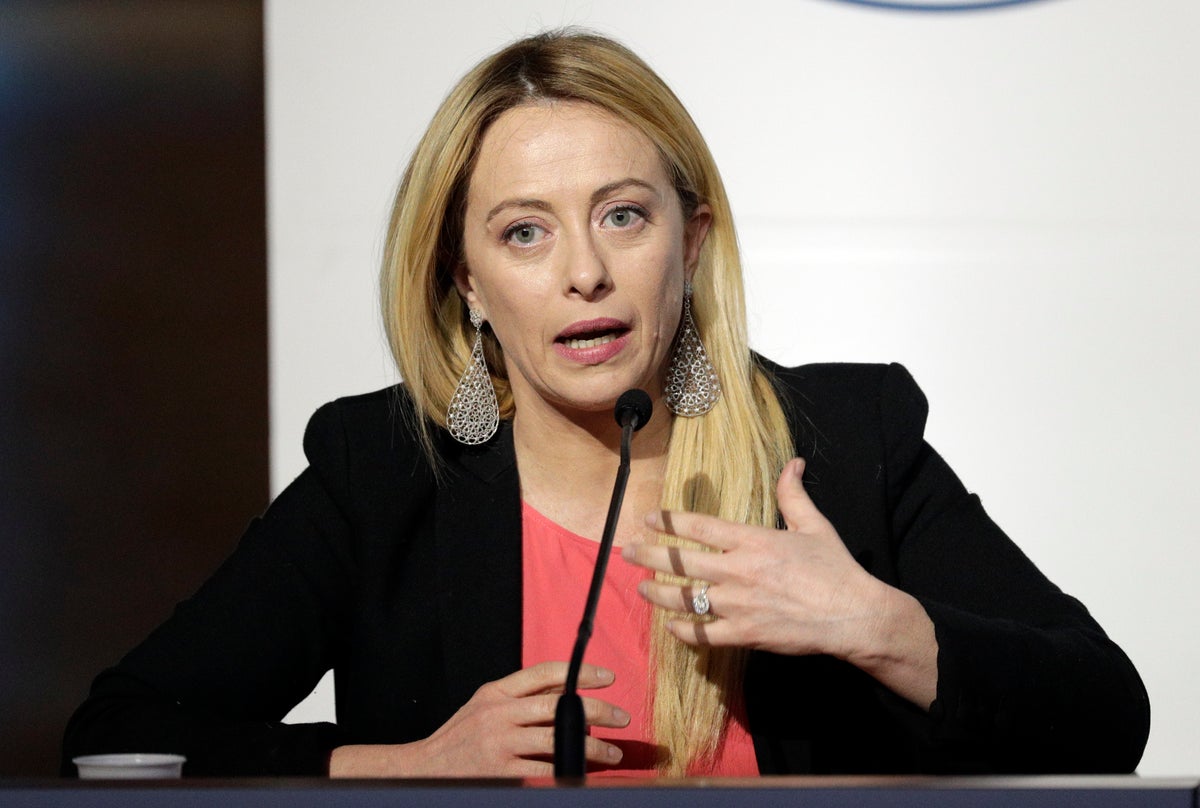
Italy’s far-right leader Giorgia Meloni, who is leading in opinion polls ahead of Sept. 25 parliamentary elections, insists she won’t be a danger to democracy if she becomes premier, contending that the Italian political right has “unambiguously” condemned the legacy of fascism.
She also dismissed as “nonsense” concerns that if her Brothers of Italy party comes to power, making her Italy's first far-right premier, there would be a risk of an “anti-democratic drift” or “authoritarian turn," or that the country might exit the group of European nations using the euro currency.
Meloni made the comments in a message recorded in English, French and Spanish, and distributed Wednesday by her campaign.
Meloni has railed against European Union bureaucracy for years as infringing on national sovereignty. But she blasted Wednesday as an “absurd narrative” that a center-right government — with her campaign allies League leader Matteo Salvini and former Premier Silvio Berlusconi — would jeopardize implementation of reforms needed to receive all of the 200 billion euros (dollars) earmarked for Italy in EU pandemic recovery funds.
"For days, I have been reading articles in the international press about the upcoming elections that will give Italy a new government, in which I am described as a danger to democracy, to Italian, European and international stability,'' Meloni said, sitting at a desk and reading the message with a stern, no-nonsense tone.
She also referred to media accounts depicting any victory by Brothers of Italy as “a disaster, leading to an authoritarian turn, Italy's departure from the euro and other nonsense of this sort.”
"None of this is true,'' she declared.
Fast-growing in popularity, her party uses a symbol featuring a tri-colored flame that had been an icon of an Italian neo-fascist party whose members included some open admirers of the rule of Benito Mussolini, the fascist dictator in the decades leading up to World War II and during the conflict. Mussolini's regime brought about a 1938 law targeting Italy's small Jewish population, excluding them from public life, including in education and business.
Meloni has been dogged by criticism that she has been ambiguous about denouncing Italy’s fascist past.
In Wednesday's message, she summarily dismissed such contentions.
"The Italian right has handed fascism over to history for decades now, unambiguously condemning the suppression of democracy and the ignominious anti-Jewish laws,'' Meloni said.
Her contention ignored attempts, including by her allies, to minimize some of Mussolini's legacy. For example, Berlusconi, referring to internal exile for Italian opponents of fascism, once said that the dictator sent them on “vacation” to Italian islands.
Recent opinion polls have indicated Meloni's support among eligible voters slightly ahead of her main rival in the election, Democratic Party leader Enrico Letta, a former premier.
Under Italy's complex electoral rules, victors need extensive campaign alliances with other parties to control Parliament. But the Democrats have struggled to match the reach of the center-right's campaign alliance, especially when they refused to ally with the populist 5-Stars, who triggered a crisis that eventually collapsed Premier Mario Draghi's broad pandemic unity coalition last month.
Still, the dynamics between the center-right and center-left bloc could shift. Letta announced on Wednesday that coming on board as a Democratic Party candidate for a Parliamentary seat will be Carlo Cottarelli, a widely-respected economist who held positions in Italy's central bank and with the International Monetary Fund.
“The next election is probably the most important we have had and likely to be in the years to come,'' Cottarelli said. The vote essentially comes down to ”progressives vs. conservatives. Italy has to decide" its future, he said.







